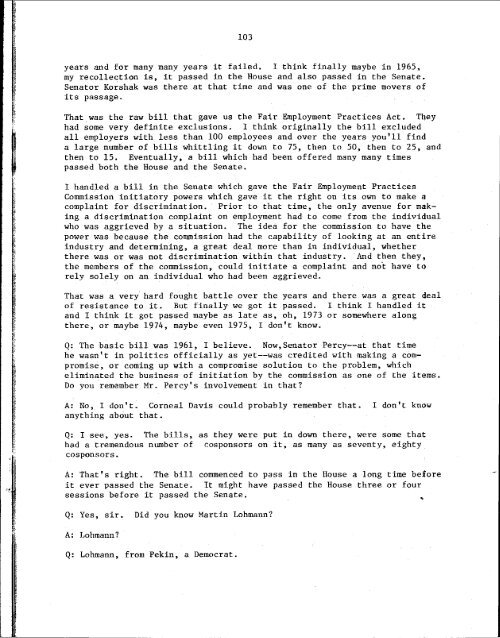Cecil A. Partee Memoir - University of Illinois Springfield
Cecil A. Partee Memoir - University of Illinois Springfield
Cecil A. Partee Memoir - University of Illinois Springfield
You also want an ePaper? Increase the reach of your titles
YUMPU automatically turns print PDFs into web optimized ePapers that Google loves.
years and for many many years it failed. I think finally maybe in 1965,<br />
my recollection is, it passed in the House and also passed in the Senate.<br />
Senator Korshak was there at that time and was one <strong>of</strong> the prime movers <strong>of</strong><br />
its passage.<br />
That was the raw bill that gave us the Fair Fmployment Practices Act. They<br />
had some very definite exclusions. I think originally the bill excluded<br />
all employers with less than LOO employees and over the years you'll find<br />
a large number <strong>of</strong> bills whittling it down to 75, then to 50, then to 25, and<br />
then to 15. Eventually, a bill which had been <strong>of</strong>fered many many times<br />
passed both the House and the Senate.<br />
I handled a bill in the Senate which gave the Fair Employment Practices<br />
Commission initiatory powers which gave it the right an its own to make a<br />
complaint for disctirninatian. Prior to that: time, the only avenue for making<br />
a discrimination complaint on employment had to come from the individual<br />
who was aggrieved by a situation. The idea for the commission to have the<br />
power was because the commission had the capability <strong>of</strong> looking at an entire<br />
industry and determining, a great deal more than in individual, whether<br />
there was or was not discrimination within that industry. And then they,<br />
the members <strong>of</strong> the commission, could initiate a complaint and not have to<br />
rely solely on an individual who had been aggrieved.<br />
That was a very hard fought battle over the years and there was a great deal<br />
<strong>of</strong> resistance to it. But finally we got it passed. I think T handled it<br />
and I think it got passed maybe as late as, oh, 1973 or somewhere along<br />
there, or maybe 1974, maybe even 1975, I don't know.<br />
Q: The basic bill was 1961, 1 believe. Now,Senator Percy--at that time<br />
he wasnk in politics <strong>of</strong>ficially as yet--was credited with making a compromise,<br />
or coming up with a compromise solution to the problem, which<br />
eliminated the business <strong>of</strong> initiation by the commission as one <strong>of</strong> the items.<br />
Do you remember Mr. Percy's involvement in that?<br />
A: No, I don't. Corneal Davis could probably remember that. I don't know<br />
anything about that.<br />
Q: I see, yes. The bills, as they were put in down there, were some that<br />
had a tremendous number <strong>of</strong> cosponsors on it, as many as seventy, eighty<br />
cosponsors.<br />
A: That's right. The bill commenced to pass in the House a long time before<br />
it ever passed the Senate. It might have passed the Bause three or four<br />
sessions before it passed the Senate.<br />
a<br />
Q: Yes, sir. Did you know Martin Lohmann?<br />
A: Lohmann?<br />
Q: Lohmann, from Pekin, a Democrat.
















